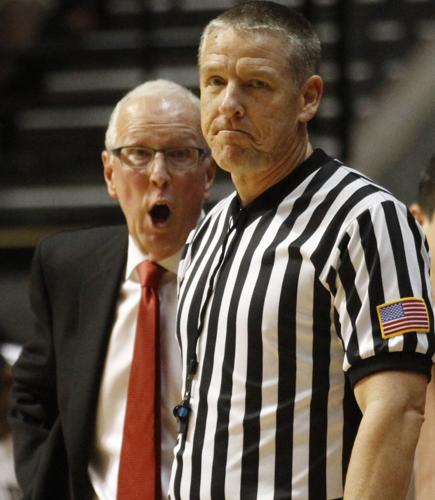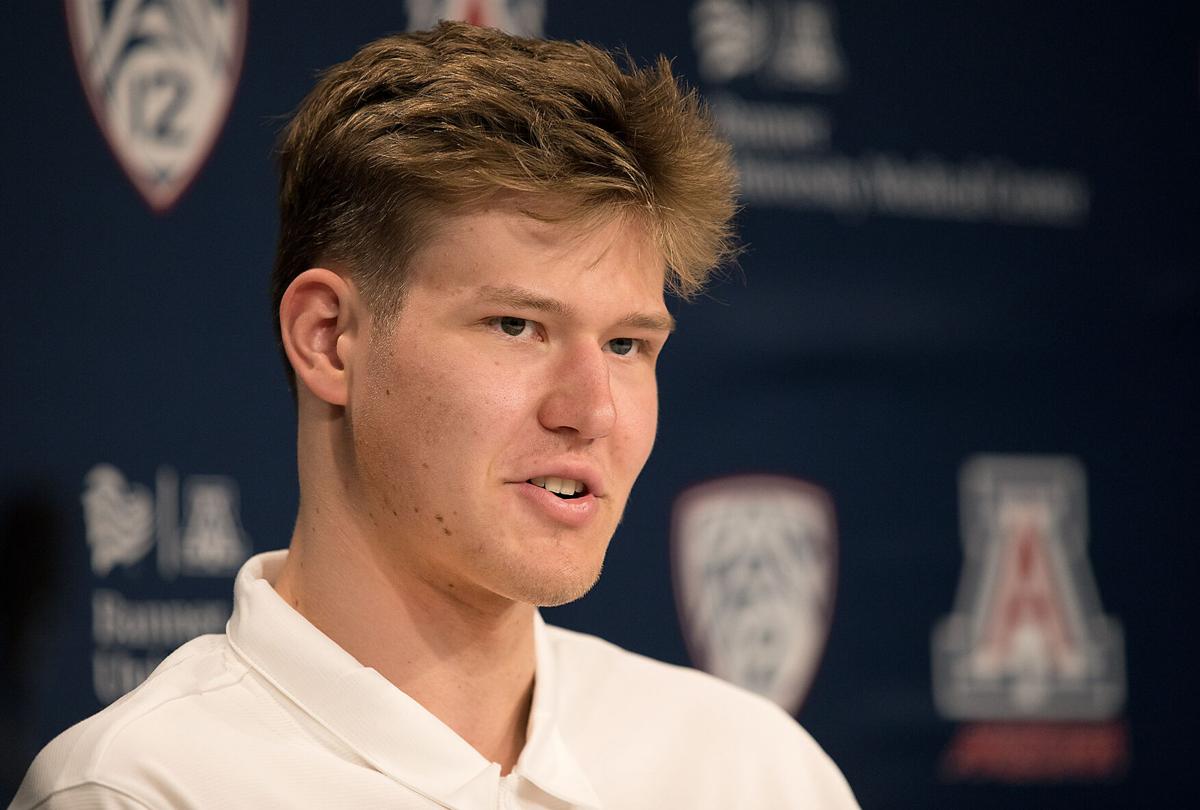While other college coaches were blowing up Henri Veesaar’s phone with a stream of texts and calls, Tommy Lloyd played it cool.
“Normally, the coaches hit you up every day, asking how was your day? Did you eat good? Did you sleep good? Some questions that I think are too much,” Veesaar said Wednesday at a news conference in McKale Center.
“Tommy gave me space, he was respectful of my own time. We talked a couple times a week.”
Plus, it’s not like there was an emoji to convey what Arizona was offering: A chance to grow and develop at the college level under Lloyd, one of the nation’s best foreign recruiters. Veesaar signed with the UA in May, and now figures to play a significant role on a Wildcats team that must replace standouts Bennedict Mathurin, Dalen Terry and Christian Koloko.
Playing in 2021-22 for Real Madrid’s top junior club, Veesaar — a 7-foot, 200-pound center from Estonia — averaged 10.2 points and 4.8 rebounds per game while shooting 67.3% from 2-point range and 35.2% from 3. ESPN’s Jonathan Givony wrote in May that Veesaar has “an intriguing skill set for a modern big man, with a 7-2 wingspan, excellent size, mobility and perimeter shooting ability that could allow him to emerge as a legit NBA prospect as his lanky frame fills out in time.”
Veesaar, 18, knows he’s not a finished product. Far from it. Asked why he chose the college route rather than stay overseas, he was blunt.
“For a young player like me, especially with (the way) my body’s built, I need time to develop,” he said. “It’s easy to play college basketball rather than go pro right now.”
Veesaar said he’s “not going to put too much pressure on myself” to make the next leap. For now, he plans to pick up tips from returning veterans like Azuolas Tubelis, who opted to return to school rather than follow Mathurin and crew to the NBA.
“I want to be in the NBA, yes. But I’m not going to tell you when, why, or like, what time period,” he said. “Hopefully its going to happen. Let’s see how it goes.”
Wednesday’s interview offered a fascinating glimpse into Veesaar’s personality. The son of a professional ping-pong-player mother, Veesaar said he prefers chess — a game he learned from his grandfather as a little boy. Veesaar said with a smile that he lived “a normal life” up until age 15, when it became clear high-level basketball was in his future.
Veesaar’s musical tastes skew toward rap, particularly J. Cole — “It’s so nice how he uses his words and rhymes together,” Veesaar said — and A Boogie wit da Hoodie.
Naming a favorite basketball player was a bit tougher. Veesaar loved Blake Griffin as a kid, but as he grew up — and up, to 7 feet — he began to follow a pair of centers: Karl-Anthony Towns of the Minnesota Timberwolves and Nikola Jokic of the Denver Nuggets. Asked to name the best player he’s ever played with, Veesaar offered a few names — then doubled back a few minutes later with more.
Veesaar also gave some insight into his “good friend” Kerr Kriisa, a fellow Estonian who’ll open the 2022-23 season as the Wildcats’ starting point guard.
“He got a lot of media attention” back home, Veesar said, “thanks to Arizona.”
Veesaar figures to fit right in alongside his countryman and other talented, young players as Arizona embarks on its Pac-12 title defense. The Wildcats will hold their annual Red-Blue Game on Sept. 30.
“I think I will be a great fit for the roster,” he said. “Tommy likes his bigs who are mobile, know how to play, read the game, make decisions with the ball, pass. … I think I’m a great fit for that.”
<&rule>
NCAA to end IARP after UA case resolved
The NCAA’s Division I board of directors announced Wednesday that it will dissolve the Independent Accountability Resolution Process once its five remaining cases, including one involving the Arizona men’s basketball program, are settled.
Formed in 2019 at the recommendation of the Commission on College Basketball, the IARP reviews the NCAA enforcement staff’s work, modifies or extends it as it deems fit, and then passes it on to a panel made up of five people with legal, higher education and/or sports backgrounds who are not affiliated with NCAA sports. The panel issues a decision that cannot be appealed.
The IARP started by taking on Memphis’ infraction case in March 2020. N.C. State’s case arrived a month later, then it was Kansas in July 2020, LSU in September 2020 and Arizona in December 2020. The sixth case, involving Louisville, was added in February 2021.
The IARP’s glacial pace has frustrated some of the schools that have opted to go that route. And in January, the IARP announced it would stop taking new cases because, according to the NCAA, their open cases “required significant resources to bring those cases to resolution.” NCAA President Mark Emmert said in April 2021 that he expected the open cases to be resolved within 12 months; they haven’t been.
Arizona is facing five Level I charges. Three involve academic misconduct and improper recruiting inducements by two of ex-coach Sean Miller’s former assistants, Mark Phelps and Book Richardson; one says Miller failed to monitor his assistants; and the fifth says Arizona had a lack of institutional control.
The NCAA said Wednesday that discontinuing the IARP and modernizing the peer-review process will “streamline the overall infractions and make better use of membership and national office resources.”
The NCAA’s new infractions policies, which also include clarifications that could reduce the number of appeals, will go into place Jan. 1.
<&rule>

Tucson's Chris Rastatter, getting an earful from San Diego State coach Steve Fisher during a 2012 game, has been named the NCAA's national coordinator of men's basketball officiating.
Tucson’s Rastatter to lead officials
Tucson’s Chris Rastatter has been chosen to take over as the NCAA’s national coordinator of men’s basketball officiating, and among his immediate plans is a comprehensive training program to help improve call accuracy during the regular season and postseason tournaments.
Rastatter’s appointment begins Thursday. He takes over for J.D. Collins, who is retiring after seven years on the job.
Rastatter has 27 years of experience in college basketball officiating, including 19 appointments to the NCAA Tournament. He was an alternate at the 2019 Final Four before working the 2021 semifinal between Baylor and Houston.
Along with trying to improve call accuracy by helping officials with mechanics and positioning, Rastatter wants to put in place a system to identify and develop the next generation of NCAA basketball officials.
Rastatter said the reason he pursued the leadership role is his love for teaching, but he also thinks he can make a difference “not only in the officiating program but how referees are perceived by those outside the officiating world.”






